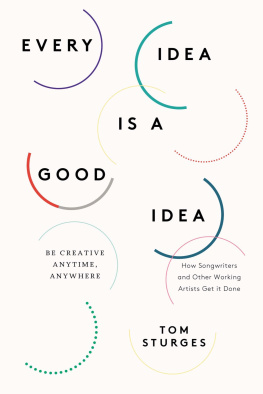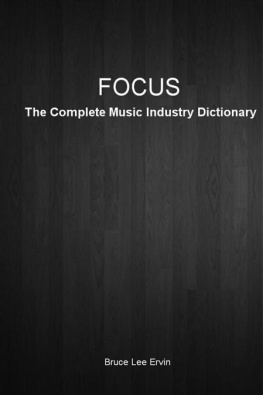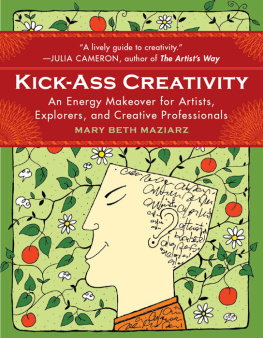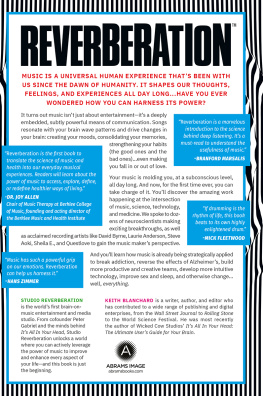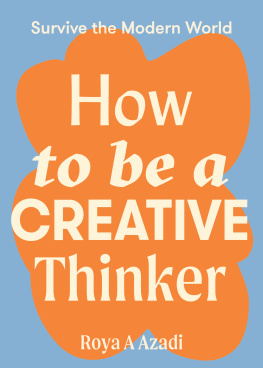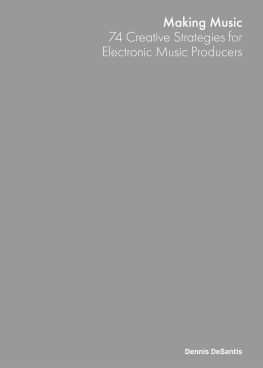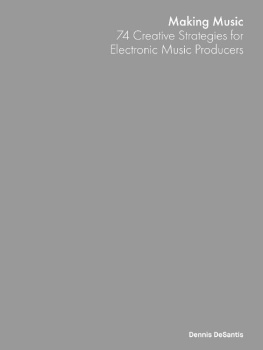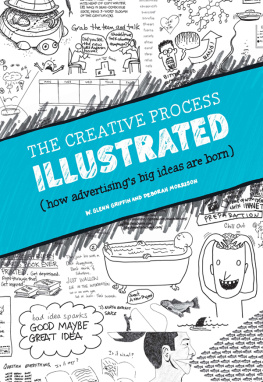T o dissect, study, teach, and analyze the creative process takes enormous insight and balls. I personally was thrust into the creative process by accident and luck. Having just become head of Columbia Recordsstraight from being the chief lawyer for the companyI had no idea I could be creative, no idea I could have ears, no idea that the world of music could unleash a passion of creativity that exhilarates me to this day. And when, in interviews, Im asked how I discovered the artists Ive signed or the songs Ive chosen for artists to record, I usually shrug my shoulders and say it was a natural, undiscovered, unknown gift. But was it? Well, after reading this very enlightening book by Tom Sturges, he challenges that notion for me; but more important, challenges that notion for what I hope is a vast multitude out there who want to explore whether they are creative or whether they can be creative. And he does it with color, with recalled experiences, with candor, with entertaining stories and anecdotes that entrance and fascinate the reader. I know that after reading this book there will be countless revelations and confessions from those who were stimulated and motivated to look deeply within and alter the course of their career or their life.
INTRODUCTION
I have been part of the music business for more than twenty-five years, most of that time as a music publisher. I was executive vice president and head of Creative for Universal Music Publishing Group. I was president of Chrysalis Music Publishing Group. I was a song plugger and talent scout for Screen GemsEMI Music Publishing, and started as a professional manager for Arista Music Publishing.
I can recognize talent in others and I can hear a hit song. I see what writers and artists are going to become as much as see who they are sitting in front of me, with the only evidence that matters being their songwriting ability. More than two hundred writers signed music publishing deals to companies I worked for, and many of them achieved lasting worldwide success. Among these were Billy Corgan of Smashing Pumpkins, Outkast and Goodie Mob, 50 Cent and G-Unit, 3 Doors Down, both Antonina Armato and Tim James of Rock Mafia, Slaughter, Green Jelly, Chris Brown, and Jack Johnson. I also signed Foo Fighters and Blink-182; writer/producers Troy Taylor, Mark Batson, and Jason Epperson (aka Jay E); and rapper and champion basketball player Shaquille ONeal. I acquired rights for several writer/artists who had only one defining hit in their careers, including Baby Bash (Suga Suga), Vanessa Carlton (A Thousand Miles), Afroman (Because I Got High), Montell Jordan (This Is How We Do It), Katrina and the Waves (Walking on Sunshine), and Owl City (Fireflies).
I was also a song plugger and placed more than eighty songs. A song plugger finds a song its home by pitching it to the right artist for a recording. I gave Huey Lewis and the News their breakout single Heart and Soul, and Pat Benatar her worldwide hit We Belong. Aretha Franklin and George Michael got I Knew You Were Waiting (for Me) and won a Grammy for it, while Celine Dion took Think Twice to the top of the UK charts and won an Ivor Novello Award for Song of the Year for writers Andy Hill and Pete Sinfield. I suggested Mariah Carey record I Still Believe for her Greatest Hits album. She had sung backup on the original recording with Brenda K. Starr many years before, so maybe that was a no-brainer. In total, the writers I signed have sold more than 175 million albums, over 26 million singles, and more than 18 million downloads, written fourteen #1 singles, and won twelve Grammy Awards. So far. There is still more to come.
At various times I was also point person for Jon Bon Jovi and Richie Sambora, Prince, Carole King, Billy Idol, Beastie Boys, Sinead OConnor, Jethro Tull, and U2, but had nothing to do with their discovery or signing.
Being surrounded by all this talent gave me a rare opportunity to learn about the creative process, because I was right there. As it happened, I watched, I listened, and I learned. I took notes and asked questions. Anytime any of the writers or artists who have graced my life began to start on something, I paid attention. I never knew I would write a book about it, but I found myself in a place of such trust and closeness within their lives that I could not help but inhale. I have observed creative genius unfettered and unfolding in its natural habitat... over and over and over again, for years. How many people can say that?
Does that make me an expert in creativity? Is there even such a thing? I would rather be considered a patient observer of the art, a collector of its techniques, its likelihood and promise, someone who has grown familiar with creativitys nuances and possibilities.
And heres what Ive come to believe. Creativity is a gift, from life to us. It exists in varying degrees, measures, and amounts in each of us, but we all have it inside. There is as much creativity in our lives as we allow there to be. On this point, Maya Angelou said you cant use up creativity because the more you use, the more you have. Creativity is a reliable source of our self-respect, innovative power, and intellectual achievement. Tapping into this forcewhether to paint an oil painting, write music, design a home, shape an advertising campaign, or discover the cure for cancerthis is when we are most human. Coincidentally, this is also when we are at our most vulnerable, most likely because the tenderness of our new ideas makes us so. While not everyone can paint or sculpt, write a symphony, or imagine a building, creativity can become a greater part of any life, enriching and ennobling it in many different ways.

